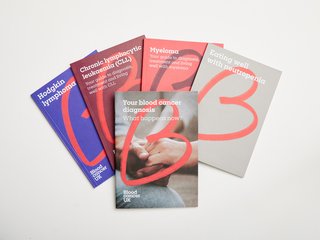Making sense of myelofibrosis
David was shocked to find he had been living with a rare chronic blood cancer without realising it. He describes coming to terms with his diagnosis of prefibrotic myelofibrosis.

It’s often said that blood cancer symptoms can be ignored, dismissed, or explained away as something completely innocuous - and I'm very much guilty of that.
Back in 2020, I had been plagued by a chronic itch, one that reached its skin-searing apex every time I took a shower. I had also been aware of a sharp pain that occurred every couple of days in my left knee. On top of this, I was feeling more tired than usual, struggling to maintain my concentration and focus at work. These symptoms had been affecting me, on and off, for over a year.
As someone who liked to work hard and play hard (I'd been working as a music journalist for two decades), I didn't hesitate to dismiss those physical aberrations.
There was nothing to worry about, I told myself – such was the cost of burning the candle at both ends.
Suffice to say, I could not have been more mistaken. In the summer of 2021, as the UK was still navigating its way through the covid-19 pandemic, it became strikingly obvious how bad my symptoms – my blood cancer symptoms – really were.
That earth-shaking revelation was delivered to me by the most wonderful, tactful haematologist, Dr Rachel Brown, after a fortnight-long stint in hospital. Due to a sudden escalation of my symptoms (I suffered an all-over body rash, high fever, weakness, and shortness of breath), I was admitted to the Acute Medical Unit at Manchester Royal Infirmary.
After two weeks of intensive blood tests, an ultrasound, and a bone marrow biopsy, I was told that I was suffering with prefibrotic myelofibrosis (MF), a rare chronic blood cancer belonging to a group of diseases known as myeloproliferative neoplasms (MPNs).
Frightened, shocked to the core, I desperately tried to make sense of my diagnosis. How could this have happened, what possibly could have caused this? At first, I had mistakenly assumed a recent covid vaccine was to blame for my steep physical decline. Of course, the truth – all those warning signs, those symptoms I was so quick to dismiss – was staring me in the face all along.
It was undeniable: my condition, my blood cancer, was something I had obviously been living with for two, maybe three years.
The covid vaccine had, most likely, simply brought my condition to the surface, exacerbating the symptoms I had already been experiencing. Such was the severity of my condition, I was instructed to immediately begin treatment with a chemotherapy drug called hydroxycarbamide – and would be required to stay on that drug indefinitely.

Without doubt one of the strangest things about blood cancers is the newfound lexicon which accompanies your diagnosis. As I struggled to make sense of my situation, wanting, but also fearing more substantial answers, I was also bombarded with all these alien-sounding medical terms – terms that would be forever part of my life going forwards.
I had to understand the concept of blood platelets, and why I needed to drastically reduce mine (over 2500 when I was first diagnosed). I had to make sense of von Willebrand levels, and how these would affect my risk of blood clots. And I came to understand how my condition can be described as various things, from blood cancer to chronic blood disorder to myeloproliferative neoplasm (MPN). As such, I can't thank my haematology team enough for helping me to navigate all this tricky terminology. Most importantly, they helped me to actually reconcile it with my situation.
The thing about MPNs, I was informed, is that you can manage them – and, hopefully, live a long and fulfilling life.
I can still vividly remember the moment when Hayley, my clinical nurse specialist, told me, “Think of an MPN as like other chronic disorders, something like diabetes. These are conditions that do impact your life, you might have to make some adjustments. But with the right treatment, you can manage them and live a normal, fulfilling life.”
At my absolute lowest ebb, when my entire worldview seemed glass half-empty, those words couldn’t have been more reassuring nor motivating. That advice proved to be a real game changer in the way I thought about my condition.
That's not to say my fears were completely alleviated.
Blood cancer brings a wealth of emotional challenges – and, in the case of prefibrotic myelofibrosis, the spectre of uncertainty looms ominously.
Prefibrotic MF is a rare variant of an already rare condition; not quite myelofibrosis, but also more advanced than another MPN called essential thrombocythemia (ET), with which it shares similar traits.
In layman's terms, the term “prefibrotic” essentially means “pre-scarring”; with prefibrotic MF, my bone marrow has changes, but it doesn’t have the scarring displayed in more advanced stages of myelofibrosis. The implication being, of course, that my bone marrow may at some point undergo that scarring, and my condition could progress. Moreover, the fact that I was 41 at the time of diagnosis – putting me below the average age of MPN patients, estimated to be around 70 – further compounded my concerns.
Those uncertainties, the lack of clear answers to ‘when/if/how’ were undoubtedly the biggest psychological challenge I faced after my initial diagnosis.
In those early days, I was required to see my haematology team every three weeks for blood tests - and each time I attended I would be a bag of nerves, fully anticipating the delivery of bad news. On one occasion I can remember having a full-blown panic attack as a nurse took my vitals.
Prefibrotic myelofibrosis leaves you in this strange, bewildering halfway house. You've got one foot planted in a condition you think you know, think you can manage; and, at the same time, your other foot is dangling over more uncertain, murkier waters, something that can turn your world upside down in a heartbeat.
Which is why it's so important to concentrate on the former – the aspects of my condition that I can manage. Two years after my life-changing diagnosis, I still cling firmly to that early advice my haematology team gave me.
Blood cancer is something I can live with, not something that has to necessarily govern my life.
Yes, I have had to make adjustments to my daily routine (thankfully, my incredibly understanding employer allows me to work reduced hours due to my chronic fatigue).
And yes, I still have to constantly remind people that just because I “look okay”, it doesn't mean that I’m not a desperately tired, chronically itchy, hyper-anxious person beneath that putative healthy exterior.
Most importantly, my regular hospital appointments, now every three months, are no longer associated with feelings of impending doom (thanks largely to my unfailingly warm, helpful haematology team). And after two years of hydroxycarbamide treatment, my blood platelets are now at a much healthier level: on average, around the 500 mark.
If I could give any advice to a newly diagnosed MPN patient, it’s to try to strip away the fear factor from all the quotidian parts of the disease.
Try not to perceive everything as a portent of doom. In time (and believe me, it will take time), all those many unnerving components – the blood tests, the symptoms, the taking of medication – will eventually just become part of your routine, things as regular as brushing your teeth. And yes, you will deal with them, if not on your own, then hopefully with the support of family and friends, or fantastic charities such as Blood Cancer UK or MPN Voice. Don’t be afraid or too proud to seek help.
Those recurring psychological battles are such a crucial part of dealing with blood cancers – battles that, once conquered, will give you a much clearer, positive perspective on your condition.

Your free guide to myelofibrosis
Includes understanding myelofibrosis, treatments and living well.


